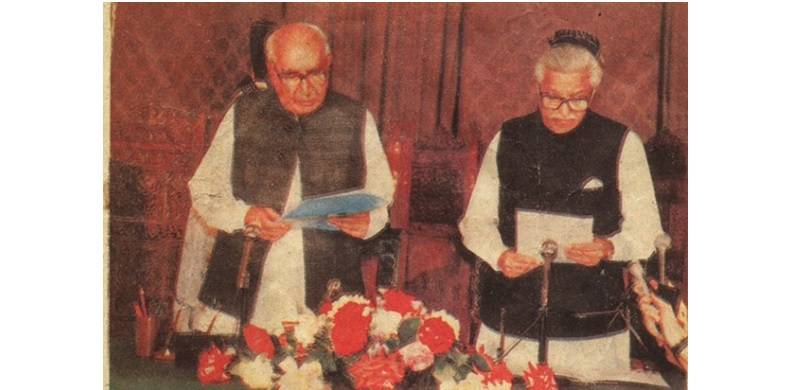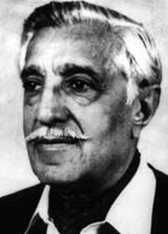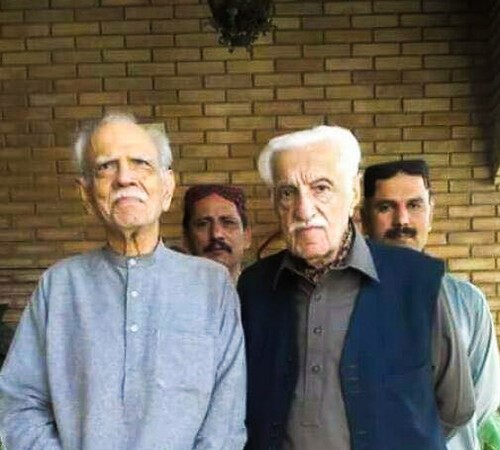
Today in 2022 we have amongst us a person who holds a unique set of political records. He is the last survivor of the second Constituent Assembly (1955-1958); one of the only two persons alive who were elected to the 1962 National Assembly (Ghulam Mustafa Khar is the other); along with Mian Muhammad Nawaz Sharif, he is the only living prime minister from the previous century; and the only Baloch tribal chief to ever become prime minister of Pakistan.
All these distinctions belong to none other than the Tumandar (paramount chief) of the Baloch Mazari tribe, the veteran politician and former caretaker prime minister, Mir Balkh Sher Mazari.
Born in 1928 in Rojhan, Dera Ghazi Khan, Mir Balkh Sher assumed the de jure chieftainship of the Mazaris in 1933, upon the untimely death of his father, Mir Murad Khan Mazari. Since 1948, he has also exercised de facto control over the tribe, a remarkable feat of 74 years’ duration!
 The Mazari chieftain’s long political career began in the early 1950s, with his election as the Finance Secretary of the Punjab Muslim League and as the Chairman of the Dera Ghazi Khan District Board. Over the next four decades, apart from his election to the Constituent Assembly in 1955, he has been elected an MNA on five occasions (1962, 1977, 1985, 1990 and 1993) and an MPA once (1970). Never has Mir Balkh Sher been defeated in any electoral contest: an achievement enjoyed by few, if any, major politicians in Pakistan’s history.
The Mazari chieftain’s long political career began in the early 1950s, with his election as the Finance Secretary of the Punjab Muslim League and as the Chairman of the Dera Ghazi Khan District Board. Over the next four decades, apart from his election to the Constituent Assembly in 1955, he has been elected an MNA on five occasions (1962, 1977, 1985, 1990 and 1993) and an MPA once (1970). Never has Mir Balkh Sher been defeated in any electoral contest: an achievement enjoyed by few, if any, major politicians in Pakistan’s history.
Some aspects of Mir Balkh Sher’s political innings are of particular interest. To begin with, he became the first person in Pakistan’s history to assume prime ministerial office without previously having held any ministerial/executive position or having served as the leader of a political party. Benazir Bhutto, too, had become prime minister in 1988 without previous governmental experience, but at least she had been the co-chairperson and the driving force of the PPP for many years before her election to the premiership. Mir Balkh Sher had no such experience to his credit.
Secondly, Mir Balkh Sher has the dubious distinction of serving as prime minister for the shortest period in Pakistan’s history. His planned 90-day tenure began on 18 April 1993, when he assumed the caretaker prime-ministership upon the dismissal of Mian Nawaz Sharif’s government by president Ghulam Ishaq Khan. However, his premiership abruptly ended after a mere 37 days, when the Supreme Court restored Nawaz Sharif to office on 26 May 1993.
It is worth mentioning that on 6 December 1971 the veteran Bengali leader Nur-ul-Amin was designated as prime minister by General Yahya Khan for the dying 14 days of his dictatorship. But since this was not a constitutional nomination, rather it was an irregular appointment under Martial Law, therefore Nur ul Amin’s brief “period in office” does not really count.
Another less than flattering distinction of Mir Balkh Sher’s career has been its lack of political constancy. In 1964, he supported Fatima Jinnah in her electoral contest with Ayub Khan, but after the latter emerged victorious, Mir Balkh Sher duly joined the king’s party, the Convention Muslim League, only to desert its ranks once Ayub Khan departed from the scene in 1969. Similarly, in 1970 he was elected an MPA as an independent candidate, one of the few politicians to withstand the PPP wave in the Punjab, but in 1974 he joined the PPP. Later, with remarkable prescience he saw the writing on the wall and he left the PPP a few months before the coup of 5 July.
From then onwards, Mir Balkh Sher has constantly aligned with the preferences of the establishment of the day. This is evidenced by his membership of General Zia’s Majlis-e-Shoora from 1981-1985, his election as an IJI MNA in 1990 and, above all, by his appointment as caretaker prime minister in 1993. A further case in point is the fact that in 2018 Mir Balkh Sher came out of nearly two decades of retirement from active politics to become the chairman of the Junoobi Punjab Sooba Mahaz, a political grouping that primarily comprised parliamentarians who broke from the PML-N when the party fell from the grace of the establishment.
Finally, no account of Mir Balkh Sher can be considered complete without a mention of his late younger brother, Sardar Sherbaz Mazari, who was one of the most principled and honourable politicians of Pakistan. Twice elected MNA (1970 & 1977) and serving as Leader of the Opposition in the National Assembly from 1975-1977, Sardar Sherbaz throughout remained steadfast in his adherence to democracy, constitutionalism and the rule of law, even turning down General Zia’s offer to become prime minister in 1980.
Both brothers also jointly enjoy a truly singular distinction in the annals of Pakistani constitutional history. As a member of the second Constituent Assembly, Mir Balkh Sher was one of the signatories of the 1956 constitution of united Pakistan. And as a member of the 1970 National Assembly, Sardar Sherbaz was one of the signatories of the 1973 constitution of truncated Pakistan.
Mir Balkh Sher’s presence in our midst reminds us of the 1950s: a bygone age of federal parliamentary politics, marked by a significant degree of old-world values, courtesy and civility. Sadly, today’s parliamentary landscape is a far cry from that era!
The writer is a lawyer and a history aficionado
All these distinctions belong to none other than the Tumandar (paramount chief) of the Baloch Mazari tribe, the veteran politician and former caretaker prime minister, Mir Balkh Sher Mazari.
Born in 1928 in Rojhan, Dera Ghazi Khan, Mir Balkh Sher assumed the de jure chieftainship of the Mazaris in 1933, upon the untimely death of his father, Mir Murad Khan Mazari. Since 1948, he has also exercised de facto control over the tribe, a remarkable feat of 74 years’ duration!
 The Mazari chieftain’s long political career began in the early 1950s, with his election as the Finance Secretary of the Punjab Muslim League and as the Chairman of the Dera Ghazi Khan District Board. Over the next four decades, apart from his election to the Constituent Assembly in 1955, he has been elected an MNA on five occasions (1962, 1977, 1985, 1990 and 1993) and an MPA once (1970). Never has Mir Balkh Sher been defeated in any electoral contest: an achievement enjoyed by few, if any, major politicians in Pakistan’s history.
The Mazari chieftain’s long political career began in the early 1950s, with his election as the Finance Secretary of the Punjab Muslim League and as the Chairman of the Dera Ghazi Khan District Board. Over the next four decades, apart from his election to the Constituent Assembly in 1955, he has been elected an MNA on five occasions (1962, 1977, 1985, 1990 and 1993) and an MPA once (1970). Never has Mir Balkh Sher been defeated in any electoral contest: an achievement enjoyed by few, if any, major politicians in Pakistan’s history.Some aspects of Mir Balkh Sher’s political innings are of particular interest. To begin with, he became the first person in Pakistan’s history to assume prime ministerial office without previously having held any ministerial/executive position or having served as the leader of a political party. Benazir Bhutto, too, had become prime minister in 1988 without previous governmental experience, but at least she had been the co-chairperson and the driving force of the PPP for many years before her election to the premiership. Mir Balkh Sher had no such experience to his credit.
Secondly, Mir Balkh Sher has the dubious distinction of serving as prime minister for the shortest period in Pakistan’s history. His planned 90-day tenure began on 18 April 1993, when he assumed the caretaker prime-ministership upon the dismissal of Mian Nawaz Sharif’s government by president Ghulam Ishaq Khan. However, his premiership abruptly ended after a mere 37 days, when the Supreme Court restored Nawaz Sharif to office on 26 May 1993.
It is worth mentioning that on 6 December 1971 the veteran Bengali leader Nur-ul-Amin was designated as prime minister by General Yahya Khan for the dying 14 days of his dictatorship. But since this was not a constitutional nomination, rather it was an irregular appointment under Martial Law, therefore Nur ul Amin’s brief “period in office” does not really count.
Another less than flattering distinction of Mir Balkh Sher’s career has been its lack of political constancy. In 1964, he supported Fatima Jinnah in her electoral contest with Ayub Khan, but after the latter emerged victorious, Mir Balkh Sher duly joined the king’s party, the Convention Muslim League, only to desert its ranks once Ayub Khan departed from the scene in 1969. Similarly, in 1970 he was elected an MPA as an independent candidate, one of the few politicians to withstand the PPP wave in the Punjab, but in 1974 he joined the PPP. Later, with remarkable prescience he saw the writing on the wall and he left the PPP a few months before the coup of 5 July.
Mir Balkh Sher has the dubious distinction of serving as prime minister for the shortest period in Pakistan’s history
From then onwards, Mir Balkh Sher has constantly aligned with the preferences of the establishment of the day. This is evidenced by his membership of General Zia’s Majlis-e-Shoora from 1981-1985, his election as an IJI MNA in 1990 and, above all, by his appointment as caretaker prime minister in 1993. A further case in point is the fact that in 2018 Mir Balkh Sher came out of nearly two decades of retirement from active politics to become the chairman of the Junoobi Punjab Sooba Mahaz, a political grouping that primarily comprised parliamentarians who broke from the PML-N when the party fell from the grace of the establishment.
Finally, no account of Mir Balkh Sher can be considered complete without a mention of his late younger brother, Sardar Sherbaz Mazari, who was one of the most principled and honourable politicians of Pakistan. Twice elected MNA (1970 & 1977) and serving as Leader of the Opposition in the National Assembly from 1975-1977, Sardar Sherbaz throughout remained steadfast in his adherence to democracy, constitutionalism and the rule of law, even turning down General Zia’s offer to become prime minister in 1980.

Both brothers also jointly enjoy a truly singular distinction in the annals of Pakistani constitutional history. As a member of the second Constituent Assembly, Mir Balkh Sher was one of the signatories of the 1956 constitution of united Pakistan. And as a member of the 1970 National Assembly, Sardar Sherbaz was one of the signatories of the 1973 constitution of truncated Pakistan.
Mir Balkh Sher’s presence in our midst reminds us of the 1950s: a bygone age of federal parliamentary politics, marked by a significant degree of old-world values, courtesy and civility. Sadly, today’s parliamentary landscape is a far cry from that era!
The writer is a lawyer and a history aficionado

